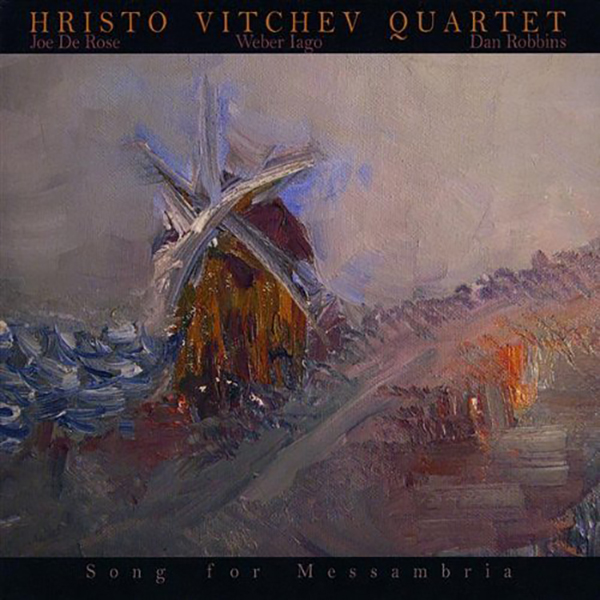
by Ian Mann
July 28, 2009
/ ALBUM
The album comes in a stylish package featuring oil paintings by Vitchev himself (I told you he was a talented guy)
Guitarist Hristo Vitchev was born in Bulgaria, studied in Caracas, Venezuela and has been resident on the West Coast of the USA since 1998. Currently based in San Jose, California he is also a music educator and a published author of musical theory.
“Song For Messambria”, a dedication to Vitchev’s homeland, is an attractive album of ten original tunes by the guitarist played with his quartet of Joe De Rose (drums), Weber Iago (piano) and Dan Robbins (bass). Vitchev mentions the influence of the German based ECM label on his music and certainly much of “Song For Messambria” sounds European in feel. There are also subtle classical and even Brazilian influences at work, all indicative of Vitchev’s well travelled background.
The opening “Waltz For Iago” is presumably a dedication to Vitchev’s piano player rather than the Shakespearian character as I’d first thought. It’s a delicate piece which features the pianist’s lyrical touch prominently. Bassist Robbins also impresses with a dexterous, elegant solo. Vitchev himself displays a light touch on semi acoustic guitar combining folk elements with the melodic touch of Pat Metheny, the latter an acknowledged influence.
Indeed much of Vitchev’s music shares Metheny’s love of melody and sense of space. “Sad Cloud” sounds anything but, with a light feel that reveals some of those Brazilian influences. There’s a sparkling solo from Iago and a lazily conversational passage from the leader with Robbins also weighing in again too on the lyrical coda. I should perhaps stress that for all its easiness on the ear there is nothing bland about Vitchev’s music. Despite the lightness of tone and touch the standard of musicianship is uniformly high and there is always plenty of interest going on.
The ballad “Looking For One” centres around Vitchev’s delicate, beautiful acoustic guitar. The understated support from the other members of the quartet is excellent with Iago making another memorable contribution with his limpid solo.
For me “Dali In Bali” doesn’t quite match the high standards of its immediate predecessors. The main theme of this Latin flavoured piece sometimes strays a little to close to seventies fusion mores or a kind of “Metheny-Lite”. The contributions of Brazilian pianist Iago help to retain a degree of interest though and De Rose’s imaginative drum patterns are also worthy of attention.
“Parisian Skies” is a return to form with Vitchev’s beautifully articulated guitar taking the lead. Despite the title there’s hint of Brazil about this too with Iago also making a significant contribution. Vitchev and Iago make a great team, complementing each other but never getting in one another’s way. Rather like Metheny and Lyle Mays, then.
“At Daybreak” is a fittingly descriptive title for one of Vitchev’s most melodic compositions. A beautifully sonorous solo by bassist Robbins takes the instrumental honours here. The warm feeling and sense of space evoked by the quartet recalls Metheny’s “Farmer’s Trust”.
The Road to Naklabeht” retains the high melodic content, De Rose’s subtly propulsive brush work supporting inventive solos from Vitchev, Robbins and Iago. The guitarist’s nimble picking is probably the pick of the bunch but as elsewhere this is an understated but outstanding group performance.
The reverential atmosphere of “Song for Messambria” makes it a fitting tribute, pairing Iago’s pellucid piano with Vitchev’s delicate guitar. The sympathetic support of De Rose and Robbins is the perfect accompaniment.
“Faith Avenue” is more propulsive and conventionally “jazzy” with characteristically excellent solos from Iago and Robbins plus a lengthy sojourn from the leader.
The closing “It Follows” is more minimalistic, a tender duet for guitar and piano. I believe Vitchev and Iago have recorded a whole album in duo format which should be well worth hearing.
I was highly impressed by “Song For Messambria”. The album may be unashamedly melodic and easy on the ear but the standard musicianship is consistently high and the listener’s attention is engaged virtually throughout. Although a prolific writer Vitchev obviously puts a lot of TLC into his compositions and arrangements.
I hope he doesn’t feel I’ve laboured the Metheny comparison too much but the innate melodic sense of both guitarists is impossible to ignore. Furthermore if you’re reading this and you’re a Metheny fan the chances are you’ll love “Song For Messambria” for its tunefulness alone. Having said that, Vitchev and his colleagues put enough of their own stamp onto this material to allay any charges of plagiarism. This is a fine record in its own right.